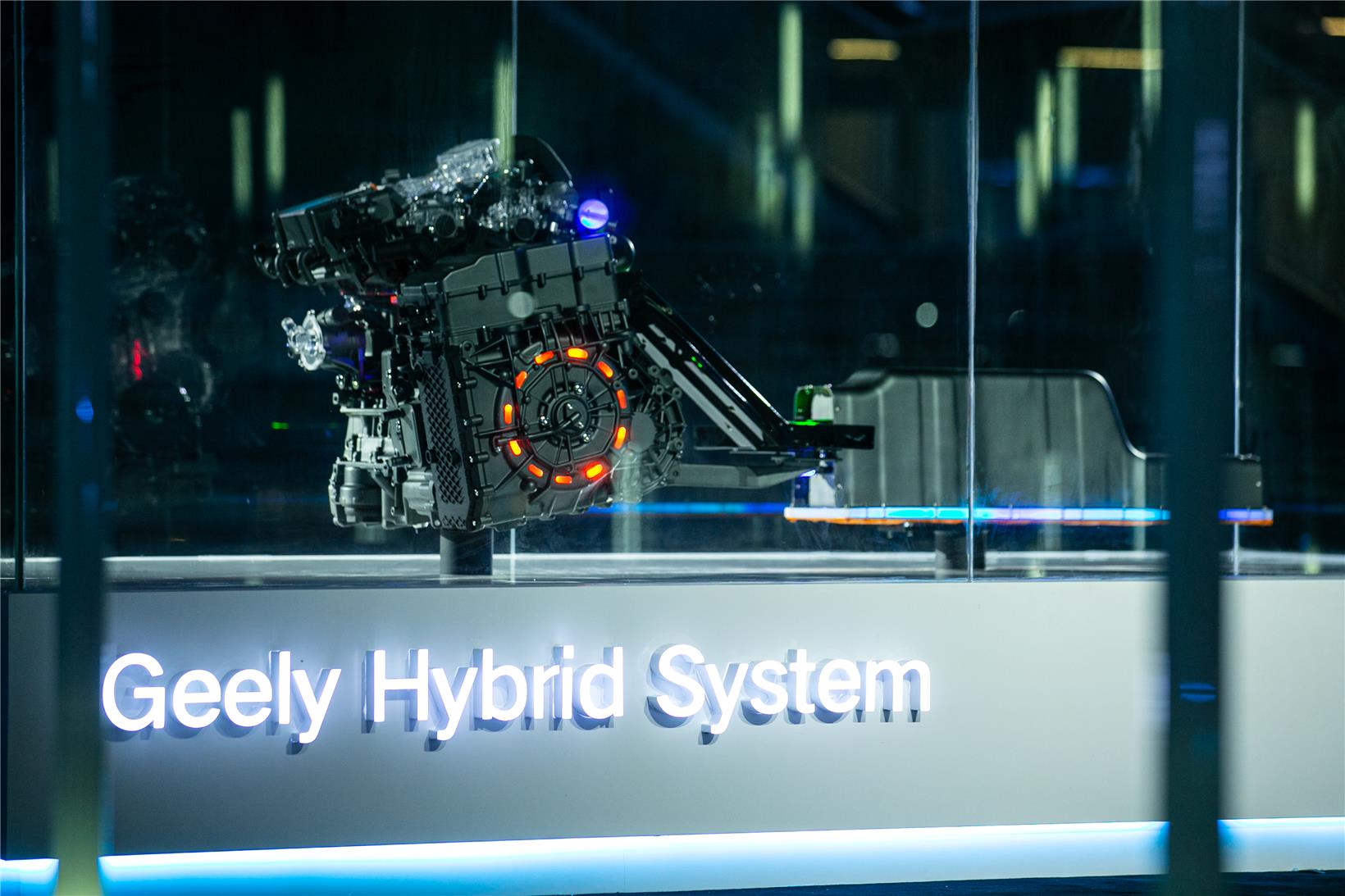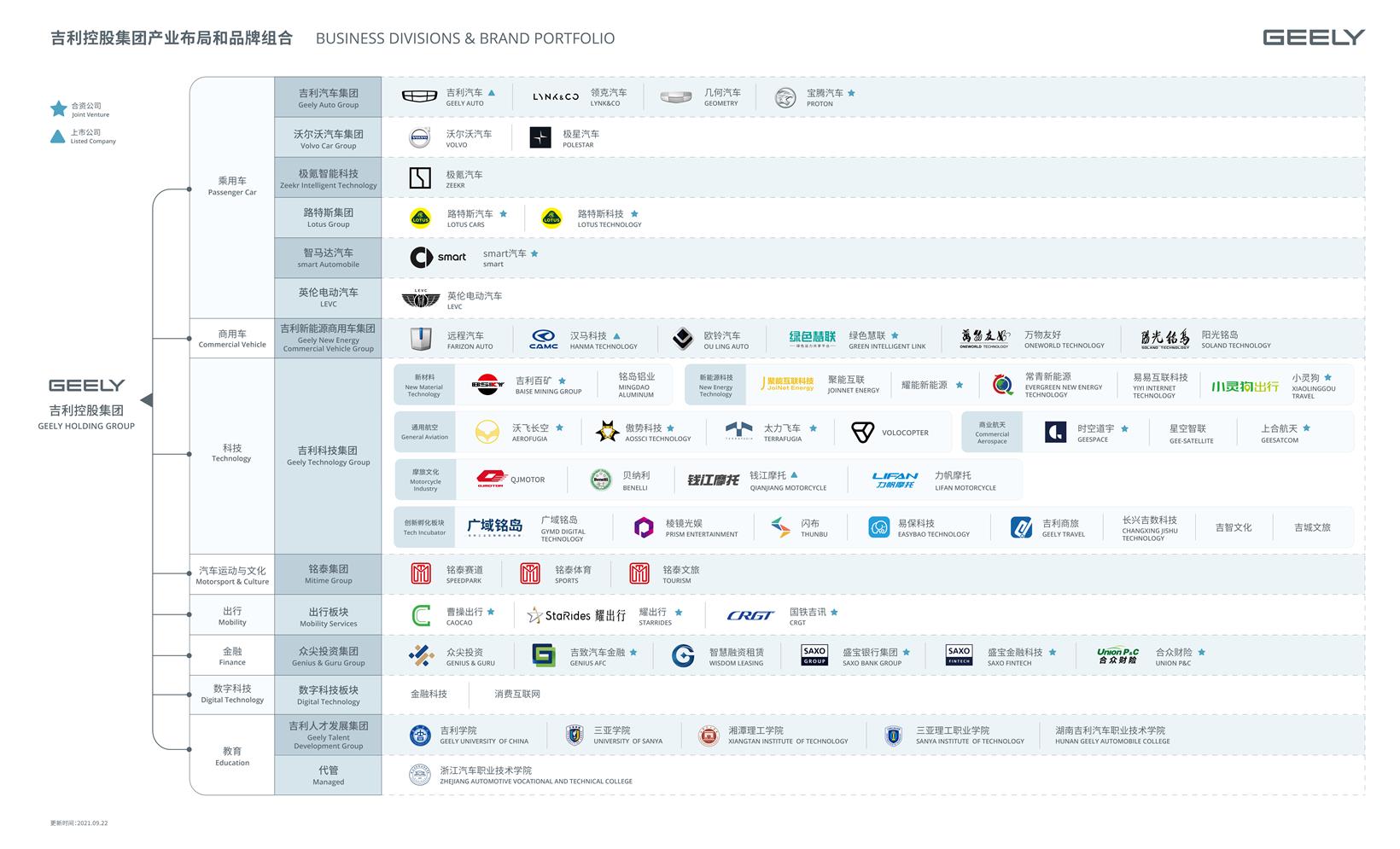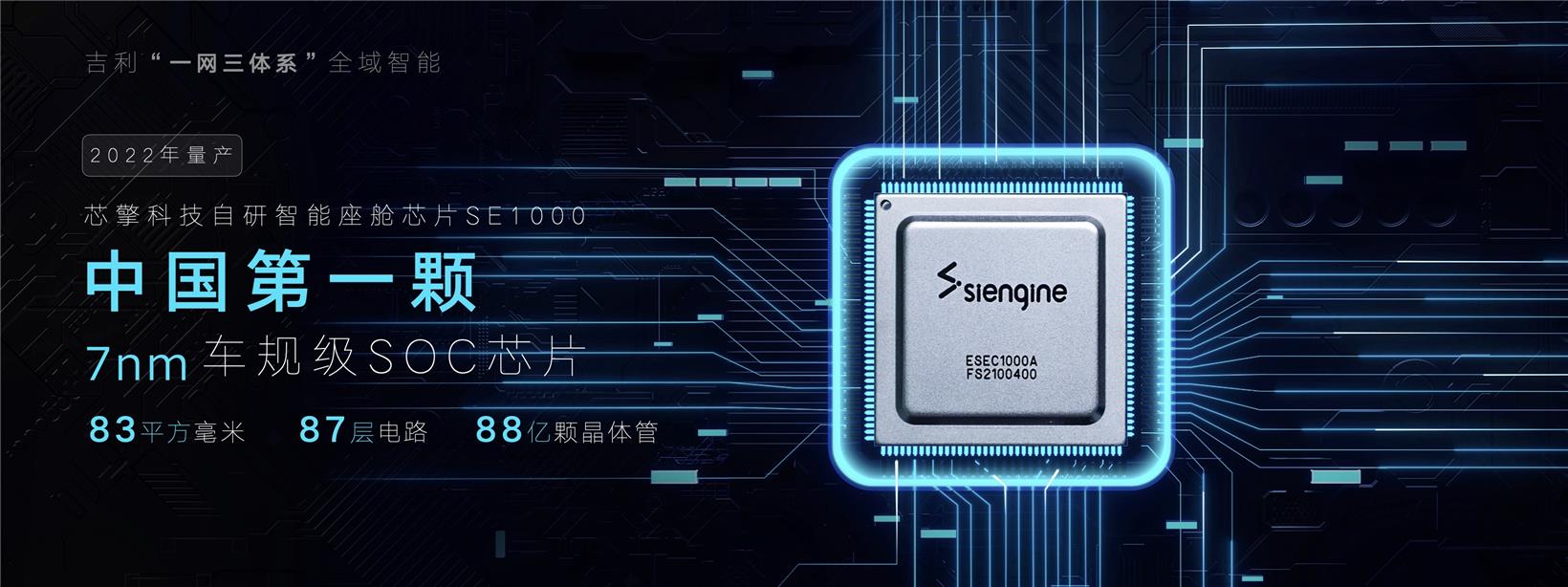Geely's ambition for 2025
On the last day of October, China’s Geely Holding Group surprised the industry with nine ambitious initiatives under Smart Geely 2025 Strategy.
They are RMB150 billion R&D investment in the coming five years, full-stack in-house development of autonomous driving technologies, launching over 25 new smart vehicle models in the next 5 years, annual sales target of 3.65 million units in 2025, overseas sales of 600,000 units, carbon emission reduction of 25% by 2025, realization of 100% full scenario digital value chain, EBIT margin of over 8% and 350 million shares for employee incentive scheme
Behind those action plans is the automaker’s mission to a technology-led company. For the next five years, the focus is to build one network and three systems.

Photo credit: Geely Holding Group
The network refers to Smart Geely Technology Ecological Network, which is committed to pushing the user experience evolvement in intelligent driving and intelligent cockpits, through Geely’s self-developed intelligent architectures and ecological alliances built around chips, software, operating systems, intelligent connectivity, and satellite networks.
Three systems consist of smart energy, smart manufacturing and smart service. For energy, Geely unveiled Leishen Power technology brand for hybrid products as well as laying out plans on battery, electric motor, electric controlling and battery swapping.
In smart manufacturing, Geely creates an industrial internet platform, the Geega, on Geely’s experience in automotive manufacturing but adaptable to all manufacturing. After integration of the platform in production plants, efficiency can be improved up to 22%.
Besides, Geely will build a user-oriented smart service system which covers the full value chain to connect users directly and seamlessly.
In an interview with ZXZC, Wang Ruiping, senior vice president of Geely Auto Group, and Kang Guowang, vice president of Geely Auto Group, talked more about the Group’s strategy.
For powertrain system, Geely plans to invest in every roadmap, including traditional power technologies, hybrid, pure electric technologies as well as other environment-friendly technologies.
Yes, traditional fossil fuel vehicles remain an important work in the next five years. Kang Guowang told ZXZC, the company will not stop sales of fossil fuel vehicles before 2025 because internal combustion vehicles are expected to account for 80% of China’s annual vehicle sales by that time. So that means those vehicles are an integral part of achieving carbon neutrality and emission reduction.
Geely will continue to improve the thermal efficiency of traditional powertrain systems. In the past several years, Geely has been developing high-efficient 2.0TD engines and 7DCT transmissions. In terms of market performance, Geely brand and Lynk & Co have done quite a good job.
Hybrid system is not an expedient, but an effective way for carbon reduction. Wang Ruiping pointed out that hybrid vehicles require no new manufacturing facilities, and can make full use of current gas stations.
The Hi-X platform from Geely’s Leishen Power brand, which was unveiled on the same day, will offer a revolutionary hybrid power experience, not only in terms of reducing fuel consumption but also a comprehensive upgrade in fuel economy, power, comfort, and intelligence.

Photo credit: Geely Holding Group
The Hi-X platform, the core product of Leishen Power brand, is claimed to be a world-class modular intelligent hybrid powertrain platform, outperforming similar hybrid technologies from Japanese rivals, such as Toyota and Honda.
Powered by 1.5TD/2.0TD hybrid-dedicated engine and DHT/ DHT Pro (3-speed), the adaptable and expandable platform can be applied from A0-class vehicles to C-class vehicles, covering various hybrid systems, including HEVs, PHEVs and REEVs.
Thanks to four advanced technologies, namely high-pressure direct injection, a supercharger, a Miller-cycle, and low-pressure EGR, the dedicated hybrid engine from the platform can achieve a thermal efficiency of 43.32%. “Actually, the data is relatively conservative, since data from labs and other institutes’ tests are much higher,” Wang Ruiping revealed in the interview.
The DHT Pro is designed to integrate two E-motors, transmission, and E-controllers, but it only weighs 120kg, achieving a torque to weight ratio of 41N•m/kg based on its maximum torque output of 4920 N•m.
Compared with other companies, such as Toyota, Honda and BYD, the Hi-X has a smart parallel drive mode which improves the efficiency of power delivery from both its engine and e-motors. The mode can be activated at speeds as low as 20km/h, much lower than 70km/h from Japanese companies’ hybrid powertrain systems. The difference enables the platform to have a 20% improved system efficiency. The DHT Pro also offers a catapult start feature improving standing acceleration by 50%. In addition, through smarter utilization of its 3 gears, acceleration between 80km-120km/h is improved for high-speed overtaking by releasing 60% of reserved power.
Since Geely has invested a lot into Leishen brand, it wants to maximize the brand’s value by going global. Wang Ruiping thought Geely’s cooperation history with international partners and its global team have laid solid foundation for the brand’s expansion to global markets. “First, we have the capability to enlarge our market shares in other countries for our software and hardware both meet international standards. And from the perspective of strategic development, we want to compete head to head with foreign rivals,” she added.
In battery electric vehicle segment, Geely launched Sustainable Experience Architecture (SEA) last year, which was developed over three years at R&D centers in China, Sweden, the UK and Germany. The architecture is not only pure electric, but also open-source, with the potential to accommodate smaller A-Segment through to larger D and E segment vehicles. The ZEEKR 001, the first production model built on the architecture, started deliveries at the end of October.
The group has formed a robust battery supply chain in the past years. Viridi E-Mobility Technology (Ningbo) Co., Ltd., its subsidiary, has mastered technologies in battery module and pack as well as the capability to design cells. Viridi has already started mass production of relevant products. What’s more, the group also established joint battery plants with such strategic partners, like CATL.
In alternative fuels, Geely is the only automaker to mass produce methanol vehicles. In 2022, Geely will launch the “Leishen Methanol Hybrid Engine”, which features a fuel consumption rate of 9L/100km, a 40% improvement from current generation methanol powertrain systems. By 2025, Geely aims to reduce consumption to 7.6L/100km, further improving cost performance and helping achieve net-zero carbon emissions in combination with methanol syn-fuels.
Methanol vehicles do have drawbacks. For example, methanol is corrosive to complete vehicle systems. But Geely has accumulated rich experience after many years’ efforts in this segment. “Our products are world leading and can be commercialized. Thousands of such vehicles are running on the roads in Guizhou and Shanxi province,” Kang Guowang added.

Methanol vehicles; Photo credit: Geely Holding Group
Fuel cell technologies is also one part of Geely’s plan. But regulations and rules are very demanding for hydrogen storage. Compared with passenger vehicles, such technologies are much applicable for commercial vehicles.
Within the group, different brands have different missions to gain advantages over outside rivals. ZEEKR focuses on premium battery electric vehicle segment and takes Tesla as its potential rivals. Lynk & Co, as a joint venture brand, focuses on hybrid segment and competes with Toyota and Honda. Geely, as a mainstream brand, will fight for market shares against main joint ventures in China. Geometry, as a mainstream electric vehicle brand, will vie with local brands and battery electric brands.

Photo credit: Geely Holding Group
All brands from Geely Holding Group have their own sales target for 2025. In total, the Holding Group aims to boost annual sales to 3.65 million units per starting from 2025. Geely brand’s target is 1.3 million while Geometry is expected to sell 300,000 that year. Lynk & Co targets annual sales of 600,000 vehicles. Besides, the Holding Group plans to sell another 600,000 vehicles in overseas markets that year.
In 2023, Geely Auto Group will launch a new battery swapping mobility brand and 5 new smart battery swapping pure electric models. The new brand’s annual sales target by 2025 is 200,000 vehicles.
Geely plans to set up 5000 super-fast swapping stations in 100 cities to meet the demands of 1 million vehicles. With Geely’s battery swapping technologies, vehicles can swap batteries in as fast as 59 seconds.
Apart from the said 5 new models from the new battery swapping brand, Geely Auto Group will launch 20 more models. Geely brand will roll out at least 10 new models while Geometry will introduce 5 battery electric models from 2022. Lynk & Co will launch 5 intelligent products and its first electric SUV model will come to European markets first.
Software is becoming increasingly important as vehicles are more and more intelligent, so traditional automakers will invest more in software. “We will enhance our efforts in software development and bear customers’ demands in mind. We embrace the philosophy that software will define vehicles,” Kang Guowang emphasized in the interview.
Notably, Geely has self-developed a smart cockpit CPU, SE1000, which has adopted a 7nm architecture and will start mass production after passing certification in early 2022. The SE1000 will become China’s first vehicle SOC with a 7nm architecture. In 2024 or 2025, a 5nm integrated vehicle CPU and high computing power autonomous driving chip will be launched to meet the computing needs of high end autonomous drive functions.

Photo credit: Geely Holding Group
Geely has opened its software architecture to developers around the world with more than 1,000 API interfaces, software tools and platforms, and service partnerships with more than 1,000 digital partners. By 2025, Geely aims to push one to two FOTA upgrades every quarter covering full vehicle and powertrain solutions, making vehicles transform from being defined by automakers to being created jointly by users and software.
Another advantage Geely boasts is its self-developed satellites and satellite networks which can help to provide direct and accurate positioning services. By 2026, Geely Holding is expected to complete the deployment of its Internet of Things communication network and low-orbit constellation. The high-precision surveying and mapping data of China will be completed by 2023 and provided to Geely Auto Group for use in enacting truly safe autonomous driving. By 2025, Geely aims to realize the commercialization of L4 technologies and develop L5 autonomous drive.
“User experience defines products, and every member in Geely knows that well. I believe Geely will continue to offer products with good user experience,” Kang Guowang told ZXZC.

